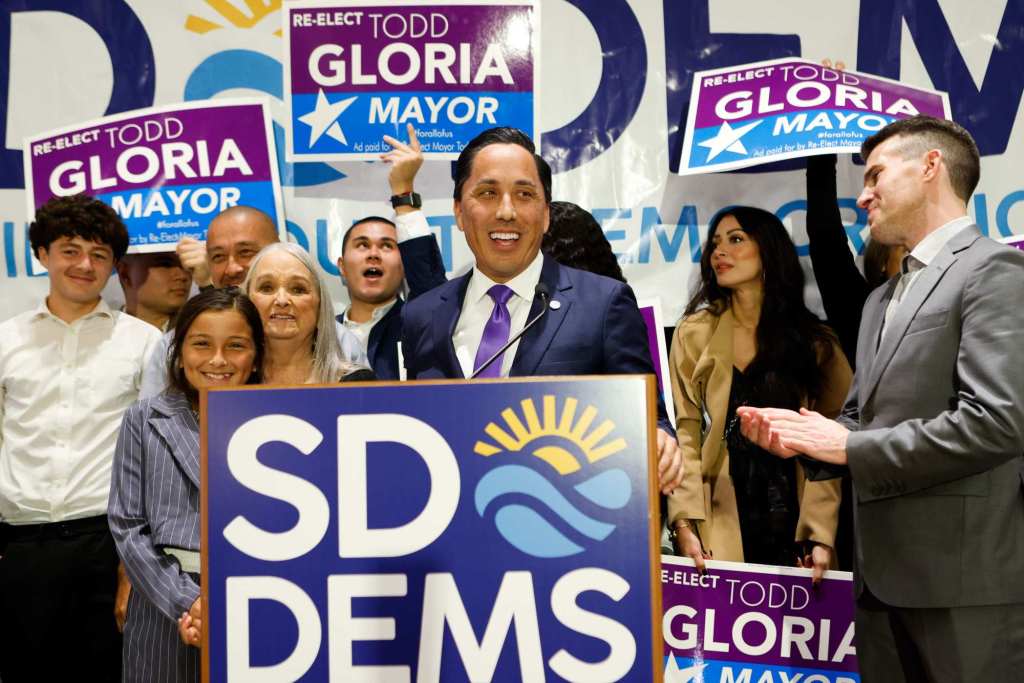

Mayor Todd Gloria and county Supervisor Terra Lawson-Remer appear to have convincingly thwarted challenges Tuesday that were outliers from the norm of San Diego politics.
That their re-elections were in doubt at all was due to a unique set of circumstances in each race — ones that would be difficult to replicate with future incumbents.
Gloria, a Democrat, faced an unknown, first-time candidate who did not have the resources to wage a citywide campaign. The mayor was essentially running against a protest candidate in Larry Turner, who had few concrete solutions.
Thus, the election for chief executive of California’s second-largest city was relegated to second-tier status. That’s until an obscure Point Loma attorney named Steven Richter took the unheard-of step of giving nearly $1.7 million to the Lincoln Club of San Diego County, a right-leaning business group backing Turner, who is not registered with any political party.
Lawson-Remer didn’t seem to have substantial challengers on the horizon, with the possible exception of Coronado Mayor Richard Bailey, until former San Diego Mayor Kevin Faulconer suddenly appeared, immediately making the contest the marquee candidate race in the county.
Faulconer, a Republican, was better known in the coastal, largely Democratic district than the Democratic incumbent, and he attracted millions of dollars in campaign support from business and real estate interests. Faulconer had shown in the past that despite his GOP registration, he had cross-party appeal.
There’s an old saw that incumbents don’t lose in San Diego, though that rule of thumb seems to have an increasing number of exceptions. Yes, former Mayor Dick Murphy resigned in 2005 after being re-elected on a technicality and one-term Supervisor Dave Roberts lost re-election in 2016, though both succumbed largely because of high-profile scandals.
San Diego City Councilmember Lorie Zapf, a Republican, was rejected by voters in 2018 in an increasingly Democratic district after she supported Donald Trump for president in 2016. That was the first council incumbent to lose re-election since 1992.
But a bigger rule was emphatically re-enforced on Tuesday: San Diego is a Democratic town.
In the city of San Diego, the mayor, city attorney and all nine council members are Democrats. The county Board of Supervisors will retain a 3-2 Democratic majority.
Taking a broader view, the election appears to seriously set back the hopes of Republicans to gain ground in urban and many suburban communities in California, along with coastal Democratic areas. Some statewide analysts viewed Faulconer as something of a canary in the coal mine as to whether Republicans had potential life in such areas across California, at least in the Trump era.
There doesn’t appear to be another high-profile Republican in the state, let alone locally, who fits that bill at the moment.
There’s little question Faulconer’s carefully crafted moderate, nonpartisan image was hurt by his turnabout from Trump skeptic in 2016 to supporter in 2020, as the former mayor geared up for an eventual dismal run for governor. Lawson-Remer hammered Faulconer on his Trump connection and hung his disastrous 101 Ash St. real estate transaction as mayor around his neck like an albatross.
Granted, there are Republican enclaves in inland North County and East County areas. Republicans appeared to make inroads in some other cities on Tuesday. Still, Democratic voter registration dominates in the county overall.
Tuesday’s results, assuming nothing weird happens in the remaining count, also point to something that now seems obvious but should be emphasized: Neither Gloria nor Lawson-Remer was as vulnerable as their critics maintained.
Gloria maintained the broad coalition of business, labor, Democratic and environmental groups that easily propelled him into the mayor’s office in 2020. His first term has had issues with increasing homelessness and major infrastructure deficiencies, among other things. Local polling has shown many San Diegans think the city is not on the right track.
But here’s a little-acknowledged, and mostly forgotten, sign of his strength: He scared off Faulconer. The former mayor was heading toward challenging Gloria this year. Faulconer even drafted a ballot measure to run on that would have required San Diego to provide a certain number of shelter beds for homeless people while cracking down on illegal encampments.
But some business interests typically aligned with Faulconer conveyed to him they had to stick with Gloria. The former mayor dropped the city initiative and shifted to running against Lawson-Remer.
Faulconer mostly ran on his record on homelessness, which had some positives but glaring negatives, contending Lawson-Remer and the county were not doing enough. But that seemed like what would have been his mayoral campaign grafted onto a supervisorial bid.
The county for decades has shirked its responsibility on homelessness, and still deserves criticism for doing so. But the county has stepped up its efforts, particularly on expanding mental health care — after Democrats were elected to a Board of Supervisors dominated by Republicans for decades.
Also worth another mention is that Lawson-Remer, backed by a strong Democratic-labor coalition she still maintains, defeated Republican Supervisor Kristen Gaspar in 2020 in a landslide.
Since then, District 3 was realigned to take in census changes, shifting further south. That gave an opening to Faulconer, a Point Loma resident, but benefited Lawson-Remer by shedding some of the more conservative inland communities in the previous district.
Both Gloria and Lawson-Remer rightly will take their re-election as validation of their first terms.
The mayor pushed through a ban on homeless encampments, added hundreds of shelter beds and advocated fewer development restrictions to spur more housing. His critics described those moves, respectively, as counterproductive, not enough, and creating more congestion.
Lawson-Remer’s re-election no doubt will embolden the supervisor to continue with efforts to boost working families and county employees, limit development in rural far-flung reaches of the county and provide financial assistance to prevent people from falling into homelessness.
Lawson-Remer may be in line to take over as board chair from Nora Vargas, who also was re-elected Tuesday, though that remains to be seen. Regardless, the county potentially faces tight budgetary times and other challenges ahead.
Gloria also could face budget deficits, though if the too-close-to-call 1-cent sales tax proposal he backed, Measure E, is decided in his favor, city coffers could have a windfall of $400 million annually.
As for Turner and Faulconer, the future, of course, is uncertain. Turner may return to political obscurity. Faulconer may move on as well, unless he can find a winnable seat to run for that may not currently exist.






